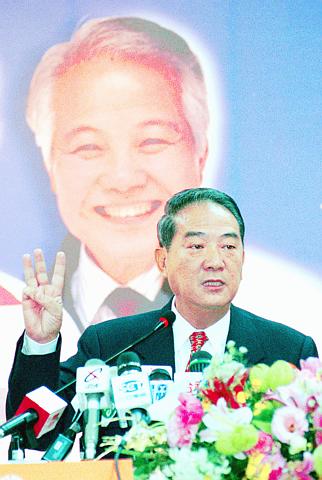In finally unveiling his cross-strait policy yesterday, independent presidential candidate James Soong (宋楚瑜) proposed that Taiwan and China sign a 30-year "mutual non-aggression peace treaty," which would be followed by a 20-year agreement basing relations on a European Union model.
Soong's running mate, Chang Chao-hsiung (
But political analysts said such a scheme would never be acceptable to China as it would entail recognizing Taiwan as an equal.

PHOTO: GEORGE TSORNG, TAIPEI TIMES
Soong also proposed that cross-strait relations be based on a "quasi-international relationship under relevant sovereignty (
Using such a definition, Soong called for both sides of the Taiwan Strait to sign a non-aggression pact, countries such as the US, Japan and ASEAN members.
When the 30-year agreement expires, both parties -- if they are not interested in changing the status quo -- should sign another 20-year agreement defining their relations based on the model of the European Union and in the status of sovereign nations, Soong said.
After that, he said, the people of Taiwan should determine whether to continue the process of integration.
When asked under what status Taiwan should sign the proposed 30-year non-aggression treaty with China, Chang replied: "Under the status of a nation. Signatories should be under the names of the Republic of China and the People's Republic of China."
This would never be palatable to China, according to political analysts.
"The real question here is China's attitude," said Joseph Wu (
Other scholars agreed.
"I'm afraid Beijing is not going to accept such a proposal. It's still a stalemate," said Hsu Szu-chien (
Hsu was equally scathing of Soong's rivals, however.
"None of these irresponsible presidential candidates has so far put forward any feasible proposal for dealing with the problem of cross-strait relations," Hsu said. "Candidates have to face the fact that there is a crisis, and they should be creative in devising ways to deal with it. The key is to involve the US and other Western countries, to use international frameworks such as the WTO, and forces for reform inside China."
Soong also took the occasion yesterday to rebut criticism from his opponents that he had been vague in his China policy.
"I am not ambiguous. I am neither for hasty unification nor for hasty independence, both of which are not mainstream ideas in Taiwan," Soong said. "My cross-strait policy is unambiguously aligned with mainstream public opinion in Taiwan."
While candidates try to pick holes in their rivals' China policies and to promote their own as somehow different, analysts said that all three of the main candidates' positions are virtually the same.
"In essence, all three are no different in their China policy," Wu said. "But this is good. It shows that people in Taiwan have built a strong consensus on the issue."
See Also:
Editorial

Right-wing political scientist Laura Fernandez on Sunday won Costa Rica’s presidential election by a landslide, after promising to crack down on rising violence linked to the cocaine trade. Fernandez’s nearest rival, economist Alvaro Ramos, conceded defeat as results showed the ruling party far exceeding the threshold of 40 percent needed to avoid a runoff. With 94 percent of polling stations counted, the political heir of outgoing Costa Rican President Rodrigo Chaves had captured 48.3 percent of the vote compared with Ramos’ 33.4 percent, the Supreme Electoral Tribunal said. As soon as the first results were announced, members of Fernandez’s Sovereign People’s Party

MORE RESPONSIBILITY: Draftees would be expected to fight alongside professional soldiers, likely requiring the transformation of some training brigades into combat units The armed forces are to start incorporating new conscripts into combined arms brigades this year to enhance combat readiness, the Executive Yuan’s latest policy report said. The new policy would affect Taiwanese men entering the military for their compulsory service, which was extended to one year under reforms by then-president Tsai Ing-wen (蔡英文) in 2022. The conscripts would be trained to operate machine guns, uncrewed aerial vehicles, anti-tank guided missile launchers and Stinger air defense systems, the report said, adding that the basic training would be lengthened to eight weeks. After basic training, conscripts would be sorted into infantry battalions that would take

GROWING AMBITIONS: The scale and tempo of the operations show that the Strait has become the core theater for China to expand its security interests, the report said Chinese military aircraft incursions around Taiwan have surged nearly 15-fold over the past five years, according to a report released yesterday by the Democratic Progressive Party’s (DPP) Department of China Affairs. Sorties in the Taiwan Strait were previously irregular, totaling 380 in 2020, but have since evolved into routine operations, the report showed. “This demonstrates that the Taiwan Strait has become both the starting point and testing ground for Beijing’s expansionist ambitions,” it said. Driven by military expansionism, China is systematically pursuing actions aimed at altering the regional “status quo,” the department said, adding that Taiwan represents the most critical link in China’s

EMERGING FIELDS: The Chinese president said that the two countries would explore cooperation in green technology, the digital economy and artificial intelligence Chinese President Xi Jinping (習近平) yesterday called for an “equal and orderly multipolar world” in the face of “unilateral bullying,” in an apparent jab at the US. Xi was speaking during talks in Beijing with Uruguayan President Yamandu Orsi, the first South American leader to visit China since US special forces captured then-Venezuelan president Nicolas Maduro last month — an operation that Beijing condemned as a violation of sovereignty. Orsi follows a slew of leaders to have visited China seeking to boost ties with the world’s second-largest economy to hedge against US President Donald Trump’s increasingly unpredictable administration. “The international situation is fraught